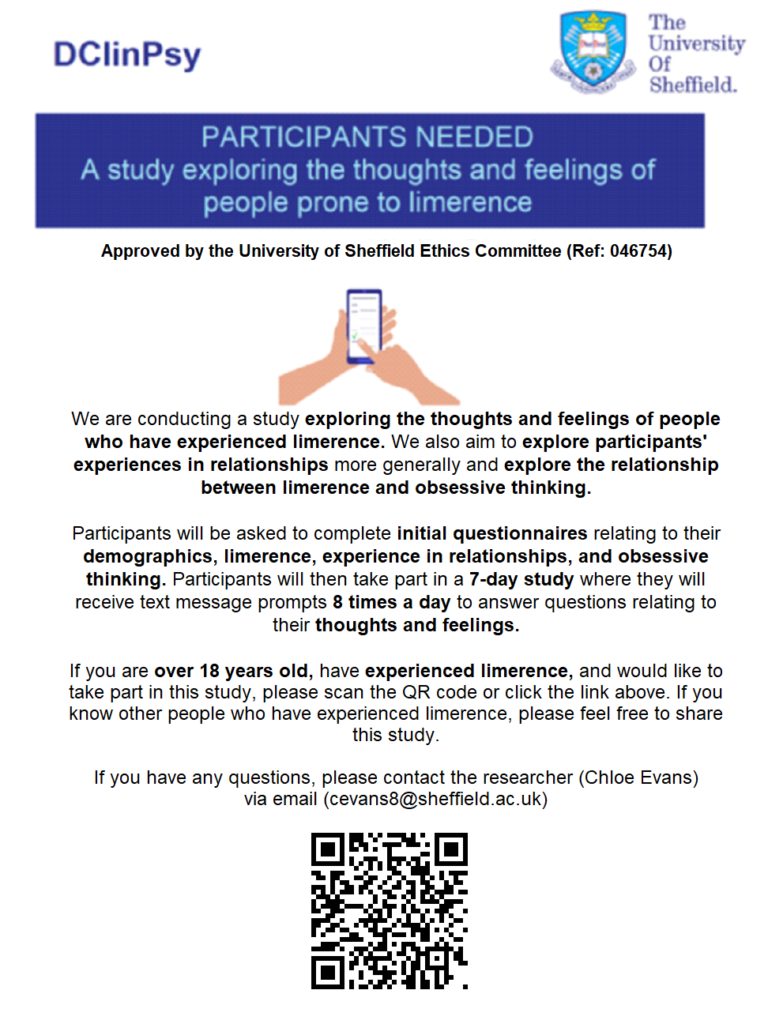I’ve lamented before about the lack of research specifically aimed at understanding limerence as a psychological phenomenon. The LwL Guide to Limerence summarises the evidence base for interested professionals (therapists and coaches, mainly), but original research on limerence is limited.
Consequently, I was very happy to hear from a researcher in the Clinical Psychology Unit at the University of Sheffield in the UK, who is conducting a study into limerence, relationships and obsessive thinking.
(For non-natives, Sheffield is highly regarded and part of the “UK Ivy League” known as the Russell Group, so it’s reasonable to assume the study will be well designed and ethically sound).
Here’s the advert and direct link for anyone who wants to know more:

The study seems to be a survey based project, analysing limerence symptoms in real time and also collecting some demographic information (presumably to look for some interesting correlations between limerence experiences and demographic categories).
It also seems to be aimed more at people currently experiencing limerence, than old sots like me who are now teetotal (and jaded by wisdom and folly).
If you think you can help, I’d encourage you to take part. We need to build up our knowledge base!

I’m already looking forward to seeing the results…

I think it’s great that somebody is taking a formal look at limerence. I looked at the website. The researcher is a PhD candidate working on her thesis. I found this interesting about the survey:
“You will then be asked to take part in a 7-day study where you will complete several questions about your thoughts and feelings in the moment, approximately 8 times a day, over 7 days. You will receive a prompt via text message and the questions will be the same each time…
The researcher(s) anticipate the probability and severity of harm occurring as a result of participating in this study as minimal. Although unlikely, asking you to reflect on your thoughts and feelings may inadvertently make you more aware of negative feelings and experiences in your life and this could be distressing.”
I agree with this but I think getting pinged 8 times/day asking about your limerent feelings has some potential drawbacks.
First, knowing your going to be pinged approximately every two hours might cause you to anticipate your responses in advance where you may or may not have any limerent thoughts if you weren’t being pinged.
Second, if you’re trying to end an LE, getting reminded 8 times/day isn’t doing a limerent any favors and I could see where it might amp up limerence. Limerents might want to think this through before participating.
That said, I’m not sure how you’d craft a data collection instrument without these potential drawbacks.
As long as the researcher takes those into account, it should be ok. I’m just not convinced the findings would be an accurate representation of limerents and LEs.
But, hey, I’m not a psychologist. I’d like to read her thesis when it’s published.
I hope people in active LEs take part. But know that at the end of the long intake, they do ask for your name, email address, phone number (all will be scrubbed down the line), and for you to attend a training session with the researcher to learn how to respond to the 7-day text process. However, they also say you can elect to receive instructions by email. I think the researcher may be underestimating the degree of secrecy/shame most people might have to overcome for all this. Not that I’m suggesting we ought to feel ashamed, but speaking for myself, it’s a bit a leap.
hello there. I just discovered your blog. I didn’t even know this term, as a term, but I know very well how it feels like. I am so sorry I missed that research…